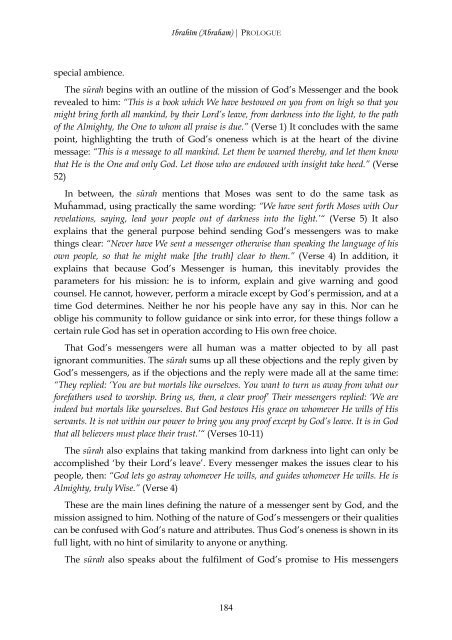Volume 10 Surah 12 - 15 - Enjoy Islam
Volume 10 Surah 12 - 15 - Enjoy Islam
Volume 10 Surah 12 - 15 - Enjoy Islam
Create successful ePaper yourself
Turn your PDF publications into a flip-book with our unique Google optimized e-Paper software.
Ibrahīm (Abraham) | PROLOGUE<br />
special ambience.<br />
The sūrah begins with an outline of the mission of God’s Messenger and the book<br />
revealed to him: “This is a book which We have bestowed on you from on high so that you<br />
might bring forth all mankind, by their Lord’s leave, from darkness into the light, to the path<br />
of the Almighty, the One to whom all praise is due.” (Verse 1) It concludes with the same<br />
point, highlighting the truth of God’s oneness which is at the heart of the divine<br />
message: “This is a message to all mankind. Let them be warned thereby, and let them know<br />
that He is the One and only God. Let those who are endowed with insight take heed.” (Verse<br />
52)<br />
In between, the sūrah mentions that Moses was sent to do the same task as<br />
Muĥammad, using practically the same wording: “We have sent forth Moses with Our<br />
revelations, saying, lead your people out of darkness into the light.’“ (Verse 5) It also<br />
explains that the general purpose behind sending God’s messengers was to make<br />
things clear: “Never have We sent a messenger otherwise than speaking the language of his<br />
own people, so that he might make [the truth] clear to them.” (Verse 4) In addition, it<br />
explains that because God’s Messenger is human, this inevitably provides the<br />
parameters for his mission: he is to inform, explain and give warning and good<br />
counsel. He cannot, however, perform a miracle except by God’s permission, and at a<br />
time God determines. Neither he nor his people have any say in this. Nor can he<br />
oblige his community to follow guidance or sink into error, for these things follow a<br />
certain rule God has set in operation according to His own free choice.<br />
That God’s messengers were all human was a matter objected to by all past<br />
ignorant communities. The sūrah sums up all these objections and the reply given by<br />
God’s messengers, as if the objections and the reply were made all at the same time:<br />
“They replied: ‘You are but mortals like ourselves. You want to turn us away from what our<br />
forefathers used to worship. Bring us, then, a clear proof’ Their messengers replied: ‘We are<br />
indeed but mortals like yourselves. But God bestows His grace on whomever He wills of His<br />
servants. It is not within our power to bring you any proof except by God’s leave. It is in God<br />
that all believers must place their trust.’“ (Verses <strong>10</strong>-11)<br />
The sūrah also explains that taking mankind from darkness into light can only be<br />
accomplished ‘by their Lord’s leave’. Every messenger makes the issues clear to his<br />
people, then: “God lets go astray whomever He wills, and guides whomever He wills. He is<br />
Almighty, truly Wise.” (Verse 4)<br />
These are the main lines defining the nature of a messenger sent by God, and the<br />
mission assigned to him. Nothing of the nature of God’s messengers or their qualities<br />
can be confused with God’s nature and attributes. Thus God’s oneness is shown in its<br />
full light, with no hint of similarity to anyone or anything.<br />
The sūrah also speaks about the fulfilment of God’s promise to His messengers<br />
184

















